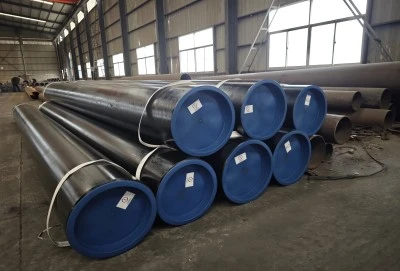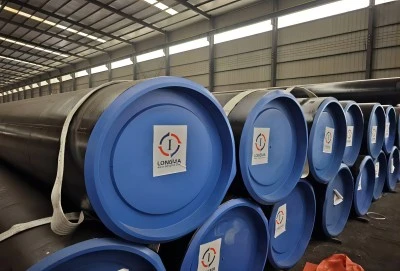Structural steel tubes come in various grades that define their mechanical properties, chemical composition, and intended applications. These grades are standardized by organizations such as ASTM International to ensure consistent quality and performance across the industry. The grading system provides engineers and designers with crucial information about material properties, enabling them to select appropriate materials for specific applications. Understanding steel grades involves knowledge of key metrics including yield strength, tensile strength, elongation, and chemical composition limits. The selection of appropriate steel grades impacts project outcomes, affecting factors such as structural integrity, fabrication methods, and long-term performance. Modern construction practices rely heavily on proper grade selection to meet building codes and project specifications while optimizing cost-effectiveness.
|
|
|
Structural Steel Tube Produced According To ASTM A500 Standard
The ASTM A500 standard serves as the primary specification for cold-formed welded and seamless carbon steel structural tubing in rounds and shapes. This comprehensive standard establishes the requirements for chemical composition, mechanical properties, and testing procedures that manufacturers must follow. The specification covers various shapes including round, square, and rectangular structural tubing, providing flexibility in design applications while maintaining strict quality controls.
Within the ASTM A500 framework, Structural steel tube manufacturers must adhere to specific production parameters that influence the final product characteristics. The standard addresses aspects such as manufacturing processes, material selection, and quality control measures. Cold-forming operations, welding procedures, and heat treatment protocols must align with the established guidelines to ensure consistent product quality.
The standard also specifies testing requirements to verify compliance with mechanical property specifications. These tests include tension testing, chemistry analysis, and dimensional verification. Regular quality control measures ensure that the produced tubing meets or exceeds the minimum requirements set forth in the standard. Documentation requirements help maintain traceability and provide evidence of compliance with specified grade requirements.
Understanding the ASTM A500 standard involves recognizing its role in material selection and quality assurance. The standard provides a framework for both manufacturers and users to ensure that structural steel tubing meets the necessary performance criteria. This standardization facilitates communication between suppliers and customers while promoting consistency in the construction industry.
Grade B
Grade B structural steel tubing represents a balanced combination of strength and formability, making it a versatile choice for various construction applications. The grade's mechanical properties are carefully controlled during manufacturing to achieve specific performance characteristics. The lower yield strength, compared to higher grades, provides advantages in fabrication and forming operations while maintaining adequate structural performance.
The plasticity and toughness characteristics of Grade B material facilitate manufacturing processes such as bending and forming. These properties result from controlled chemical composition and processing parameters that influence grain structure and mechanical behavior. The material's ability to undergo plastic deformation without failure makes it particularly suitable for applications requiring post-production forming operations.
Grade B tubing demonstrates excellent weldability, an important consideration in construction applications. The material's chemical composition and microstructure contribute to favorable welding characteristics, reducing the risk of weld-related defects. This property proves particularly valuable in projects requiring extensive field modifications or complex joint configurations.
The grade's balanced properties make it economical for many standard construction applications. Its widespread availability and established fabrication procedures contribute to its popularity in the construction industry. The material's predictable behavior during processing and installation helps minimize construction delays and complications.
Grade C
Grade C structural steel tubing offers enhanced mechanical properties that make it suitable for demanding applications requiring higher strength levels. The increased yield and tensile strength values result from careful control of chemical composition and processing parameters during manufacture. These improved mechanical properties expand the potential applications while maintaining acceptable fabrication characteristics.
The higher strength levels of Grade C material provide advantages in applications where weight reduction or space constraints exist. The ability to use smaller sections while maintaining load-carrying capacity can lead to more efficient designs. This characteristic proves particularly valuable in projects where structural weight impacts overall design considerations.
Grade C tubing exhibits good performance at elevated temperatures, making it suitable for applications involving thermal exposure. The material's stability under temperature variations results from controlled alloying elements and processing conditions. This property becomes particularly important in industrial applications or environments subject to temperature fluctuations.
The enhanced mechanical properties of Grade C material require attention to proper fabrication procedures. While the material maintains good fabrication characteristics, its higher strength levels may necessitate modified processing parameters. Proper attention to welding procedures and forming operations ensures optimal performance in finished structures.
Steel Structural Tubing Manufacturer
LONGMA GROUP has established itself as a leading manufacturer in the structural steel tubing industry, demonstrating exceptional capabilities in producing high-quality steel products. Their specialized focus on large-diameter and thick-walled tubing addresses specific market needs in major construction and infrastructure projects. The company's expertise in various welding technologies, particularly LSAW and ERW processes, ensures consistent product quality across their range.
The manufacturing facilities at LONGMA GROUP incorporate advanced production technologies and quality control systems. Their significant annual output, exceeding 1,000,000 tons by the end of 2023, reflects their substantial production capacity and market presence. The company's commitment to quality and innovation drives continuous improvement in manufacturing processes and product development.
LONGMA GROUP is a renowned provider of top-tier structural steel tubing, catering to the needs of construction experts and project managers who demand precision and reliability. Their team of specialists is committed to delivering tailored solutions that meet the unique demands of each project. By reaching out via info@longma-group.com, clients can engage in detailed discussions about their specific requirements and gain insights into the diverse range of options LONGMA GROUP has to offer. With a strong foundation in technical knowledge and state-of-the-art production facilities, LONGMA GROUP stands out as a key collaborator in the realm of construction and infrastructure projects, ensuring that every structural need is addressed with the utmost professionalism and efficiency.














